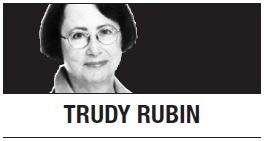
Here’s the good news about the crisis over North Korea.
We are not going to war. Donald Trump is not going to nuke Pyongyang, reckless, rhetorical threats to the contrary. Nor is North Korea’s Kim Jong-un going to nuke Guam.
Yes, I know the president just threatened to meet any more North Korean threats to the United States “with fire and fury like the world has never seen.” This is the kind of extreme military rhetoric by a US president the world has never seen, except by Harry S. Truman before bombing Nagasaki. Kim responded by threatening a preemptive strike against Guam, a US territory with American military bases.
But a preemptive war is not on the horizon, with one key caveat: My prediction may soon reverse if Trump’s team can’t muzzle the president. For months, observers have warned that Trump’s tweets and careless comments could endanger our country in a crisis. You couldn’t find a better example than the president’s fiery war of words with Kim.
The president’s bombast was off the cuff, at a news conference on opioids in New Jersey. No national security adviser was present, nor was anyone warned beforehand, according to news reports.
Trump not only freaked out our Asian allies, he also risked provoking worse behavior by Pyongyang, where a skittish young leader appears convinced that America wants to carry out a regime change. So Kim is willing to raise his threat level to scare off the Americans.
Trump’s words were no doubt perceived by Kim as a warning of a likely preemptive attack on North Korea, which led to his dangerous riposte on Guam.
But the president also undercut his own team -- who were making some important progress in putting the squeeze on Pyongyang. Only last week, the US ambassador to the United Nations, Nikki Haley, pushed through the harshest sanctions yet against North Korea’s nuclear program, with China and Russia on board. These sanctions could cut North Korea’s foreign earnings, which fund its military, by a third.
Much more needs to be done to ensure enforcement of UN sanctions, to curb North Korea’s export of workers, and to pursue US secondary sanctions against foreign banks that help the North. The model (despite differences) should be the sanction policy that forced Iran to the nuclear bargaining table.
In tandem with the sanctions push, Secretary of State Rex Tillerson had made a key statement aimed at reassuring Kim. He said America does “not seek a regime change” or collapse, or an accelerated reunification of the two Koreas. Tillerson also said, “We do not seek an excuse to send our military north of the 38th parallel.”
In other words, despite competing statements from different Trump team officials, the nucleus of a smart North Korea policy was emerging: aggressively pursuing sanctions and compliance from Beijing, moving at a much faster pace than President Barack Obama did with Iran, while trying to reassure Kim of the US’ intent. The goal: to get North Korea to stop testing missiles and nukes and return to the bargaining table.
There is no guarantee of success, but given the likelihood of hundreds of thousands of Korean and Japanese deaths should a new Korean war break out, a policy worth pursuing.
Then, Trump casually — and without consultation — blew it up.
Tillerson, reportedly blindsided, tried to walk things back, saying nothing had changed and “Americans should sleep well at night.”
But Americans can’t sleep easy if Trump continues to say whatever comes to his mind on North Korea. As CNN pointed out, Trump frequently uses the phrase “like the world has never seen” to brag about his achievements, but in this case the intended audience is not his fan base and the phraseology implies nuclear war.
Trump clearly misunderstands the presumed target of his rhetoric, whom he thinks he can bully into better behavior. However, Kim, who’s mainly concerned with staying in power, already knows that an attack on the US would be suicidal, says Scott Snyder, the Council on Foreign Relations’ top Korea expert. But the young leader is making a major miscalculation by “using threats in a more provocative way than we saw (Soviets) doing in the Cold War.”
This escalation of threats could provoke Kim into doing something rash, which might in turn persuade Trump to order military retaliation. From such rhetoric and miscalculations, a war could begin.
Then again, if Trump keeps escalating his threats but does nothing, he will be seen as a paper tiger. Already, the new red line he set in his “fire and fury” riposte is making America’s allies wonder if US policy on North Korea will ever be coherent or reliable with Trump at the helm.
The best advice I’ve heard, from the Atlantic Council’s Robert Manning, a veteran of past negotiations with Pyongyang, is: “Stop getting hysterical every time they (the North Koreans) do something.”
Trump should make clear, as part of an overall policy, that any use of WMD would result in a massive American reaction. But beyond that, his team needs to press behind the scenes for a broader, tougher sanctions regime, involving European and Asian allies. And pressure on Beijing and Moscow to comply with UN sanctions should be tough and constant.
The “fire and fury” episode sends a warning of where Trump’s loose tongue could lead. That prospect presents a more immediate danger than does Pyongyang.
By Trudy Rubin
Trudy Rubin is a columnist for the Philadelphia Inquirer. -- Ed.
(Tribune Content Agency)








